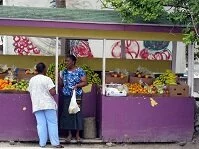Culture & Identity of the Bahamas
Introduction

Fruit market
Unlike the stereotypical Bahamas, which is white sand beaches and paradise every moment of every day, most Bahamians life in a city. Although nearly 85% of the people live in cities in the Bahamas, life still moves at a leisurely pace and the people seem to be on island time.
A Bahamian city is like many other world cities, but the rush of people trying to get to work or home is a bit tamer and punctuality is not as important as it is elsewhere. However, it is still the cities that dictate the way of life for most Bahamians since most Bahamians live in the cities. However, due to huge tourism numbers, almost the entire economy is based on services, including tourism, which accounts for roughly half the country's jobs.
For most services jobs, both in tourism and otherwise, work tends to follow a fairly set schedule. For many people this means work begins at about 9:00 am and ends at about 5:00 pm. However, with a heavy dependence on tourism, jobs have various hours as many people work evenings, nights or weekends regularly. For others the work week runs from Monday to Friday and some jobs also require work on Saturday.